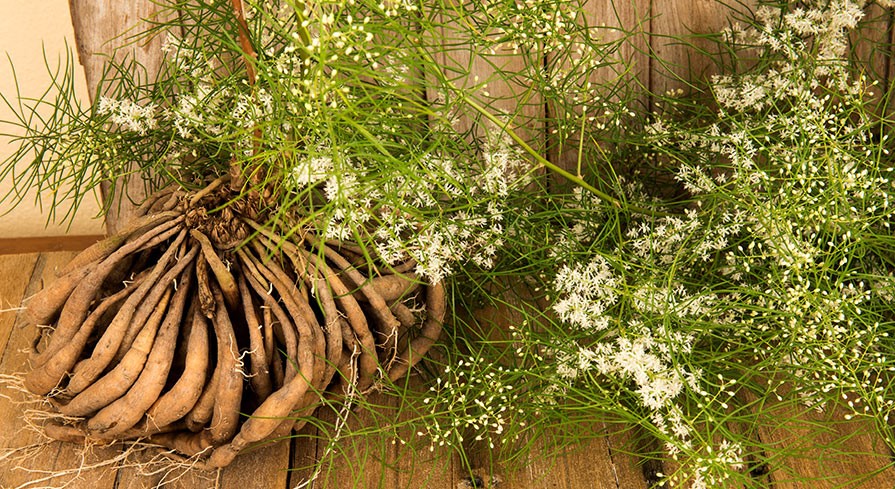
Today I want to bring to your attention a powder that in western culture might not be so known but trust me, it works. First of all if you haven’t already, you might want to take a look at this article “Ayurveda, a forgotten world?” to get the bases of what I am about to write about.
I started this journey for personal reasons and after a good few attempts using modern medicine, useless to say didn’t go well since i kept looking, I found this gem that finally worked.
Ayurveda, the ancient Indian system of medicine, has been in practice for thousands of years. It is based on the belief that health and wellness depend on a delicate balance between the mind, body, and spirit. Ayurveda focuses on prevention and treatment of disease through a natural and holistic approach. One of the lesser-known gems of Ayurveda is shatavari, a plant with a wide range of health benefits.
Shatavari, also known as Asparagus racemosus, is a member of the asparagus family. It is a climbing plant with small, white flowers and a long, tuberous root. The plant is native to India and is found throughout the country, as well as in Nepal, Sri Lanka, and the Himalayas. Shatavari has been used in Ayurvedic medicine for centuries, and is considered one of the most important herbs for women’s health.
The name “shatavari” comes from the Sanskrit word “shat” meaning “100” and “vari” meaning “roots”. This refers to the plant’s numerous roots, which are believed to have many medicinal properties. Shatavari is known as a “rasayana” in Ayurveda, which means it is believed to have rejuvenating and nourishing effects on the body.
Shatavari is a potent adaptogen, which means it helps the body cope with stress. It is also known for its anti-inflammatory, anti-tumor, and anti-diabetic properties. The plant contains a range of active compounds, including saponins, flavonoids, and alkaloids, which are responsible for its therapeutic effects.
Shatavari is particularly beneficial for women’s health. It is known to balance the female reproductive system, and is often used to treat menstrual problems, such as irregular periods, premenstrual syndrome (PMS), and painful periods. Shatavari is also believed to increase breast milk production in nursing mothers, and is often used to improve fertility in women.
In addition to its benefits for women’s health, shatavari has a range of other health benefits. It is known to boost the immune system, improve digestion, and reduce inflammation. Shatavari is also believed to have a calming effect on the mind, and is often used to treat anxiety and insomnia.
Despite its many health benefits, shatavari is relatively unknown in the Western world. However, interest in Ayurveda and traditional medicine is growing, and shatavari is becoming more widely recognized for its therapeutic properties.
Shatavari is available in a variety of forms, including capsules, powders, and tinctures. It is generally safe and well-tolerated, although it may interact with certain medications, and should not be used during pregnancy without the advice of a healthcare professional.
In conclusion, shatavari is a gem in Ayurveda, with a range of health benefits that are only beginning to be recognized in the Western world. As interest in traditional medicine grows, we can expect to see shatavari become more widely used as a natural remedy for a range of health problems.
The recommended dosage of shatavari powder can vary depending on the individual and the specific health concern. As a general guideline, the recommended dosage is 1 to 2 teaspoons of shatavari powder per day, taken with water or milk. Consult with a healthcare professional if you are unsure about the appropriate dosage for your needs.
Mix with a liquid: To take shatavari powder, mix the appropriate dosage with a liquid of your choice, such as water, milk, or juice. Stir well to ensure the powder is fully dissolved. Some people prefer to mix shatavari powder with warm milk or tea to enhance its calming effects.
Take on an empty stomach: It is recommended to take shatavari powder on an empty stomach, preferably in the morning. This will help to optimize absorption and effectiveness. However, some people may find that taking shatavari powder with food helps to reduce any digestive discomfort.
Consistency is key: Like many herbal supplements, shatavari powder works best when taken consistently over time. It is recommended to take shatavari powder daily for at least 6-8 weeks to see maximum benefits. If you are taking shatavari powder for a specific health concern, it may take longer to see results, so be patient and consistent with your usage.
Consult with a healthcare professional: If you are pregnant, breastfeeding, or have a medical condition, it is important to consult with a healthcare professional before taking shatavari powder. Shatavari may interact with certain medications, so it is important to discuss any potential risks or concerns with a healthcare professional.
In conclusion, taking shatavari powder is a simple and effective way to support your overall health and well-being. By following these guidelines, you can ensure that you are taking shatavari powder safely and effectively.